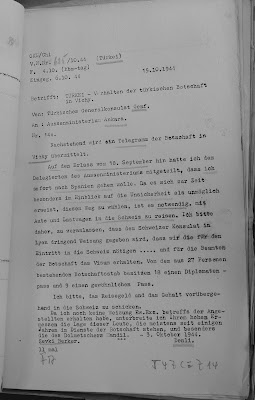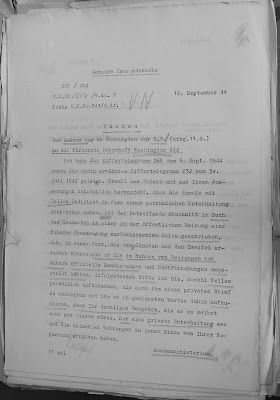During the
war Turkey, as a neutral power, had a major advantage since it could operate
embassies in both Allied and Axis nations. This gave Turkish officials the
opportunity to get valuable information from both sides. For this reason
Turkish diplomatic communications became a target for Axis and Allied
cryptanalysts.
The Turks
used mainly 4-figure codebooks (INKILAP, ZAFER, SAKARYA, CANKAYA, INONU, ISMET)
enciphered with additive sequences.
Turkish systems
were attacked by several German agencies. The diplomatic codes were attacked by
the Pers Z, Forschungsamt and OKW/Chi. Military systems by the OKL Chi Stelle,
the Army’s Inspectorate 7/VI and OKW/Chi.
Italy,
Hungary and Finland also read Turkish traffic with significant success
throughout the war.
All the Axis
powers took advantage of the fact that some of the Turkish codebooks were simply
repaginations of previous versions.
German
effort
The codebreaking
department of the Foreign Ministry - Pers
Z attacked Turkish diplomatic systems since 1934. These were continuously
solved till the end of the war. There was a separate department for Turkish
traffic headed by Dr. Hermann Scherschmidt.
Goering’s Forschungsamt also read Turkish
diplomatic traffic, especially that of the Moscow embassy.
The
codebreaking department of the Armed Forces High Command - OKW/Chi dealt with Turkish military and diplomatic traffic with
good results. The Turkish desk had about 10 people and was headed by Dr Locker.
According to Mettig, second in command of OKW/Chi in the period 1943-45, the
solution of the Turkish traffic (especially from London, Paris and Moscow) was
one of the major OKW/Chi achievements during the war.
The
Luftwaffe’s OKL Chi Stelle monitored
Turkish AF traffic. According to chief cryptanalyst Ferdinand Voegele three simple
systems were solved by forward units.
OKW/Chi
decodes of Turkish diplomatic traffic can be found in the TICOM collection of
the German Foreign Ministry’s Political Archive.
The Army’s
signal intelligence regiment KONA 4
monitored Turkish traffic both military and police. The central agency OKH/Inspectorate 7/VI read Turkish
systems and shared results with the Forschungsamt. One of the codes read was
that used by the Turkish president when onboard the state yacht ‘Savarona’. Army
cryptanalyst Dettmann, head of cryptanalysis in the Eastern Front, says in
DF-112 that the results of the Yalta conference became known to the Germans
through Turkish messages.
The war diary of Inpsectorate 7/VI shows that Turkish codes were constantly read. For example:
The war diary of Inpsectorate 7/VI shows that Turkish codes were constantly read. For example:
Report of
October 1942
Report of May 1943
Most of this traffic was solved by forward units. The reports of KONA 4 (Kommandeur der Nachrichtenaufklärung - Signals Intelligence Regiment) which covered traffic from the Balkans and the Middle East show that Turkish military and police codes were solved in 1943-44.
In 1944 1.002 messages were solved in the first quarter and 1.200 in the second.
Italian effort
Hungarian
effort
The Hungarians
put special emphasis on the solution of Turkish traffic and assigned their best
cryptanalyst Titus Vass to the Turkish desk.
Finnish
effort
The Finnish
codebreaking department devoted a third of its cryptanalysts on Turkish
traffic with the result that all the 4-figure codes were read. For example:
Allied
effort
The Western Allies
were also interested in the Turkish diplomatic communications.
The US Army’s
Signal Security Agency started
attacking Turkish and Arabic traffic in 1942. Its official history ‘Achievements of the Signal Security Agency in
World War II' says:
‘Late in 1942 work was initiated on the
systems of those governments who use the Arabic and Turkish languages. After a modest beginning the traffic of the
following governments was read: ‘Egypt, Ethiopia, Iran, Iraq, Lebanon, Saudi
Arabia, Syria, Transjordan, and Turkey. Of these, by far the most Important in
production of valuable information and in extent of the task of solution were
the Turkish systems.’
The British codebreakers also exploited Turkish traffic. Britain had
been reading Turkish traffic for decades and continued to do so during WWII. Diplomatic
traffic was worked on not at the famous Bletchley Park facility but at the Diplomatic section in Berkeley Street,
London. The embassies monitored were London, Kuibyshev, Teheran,
Budapest, Lisbon, Rome, Madrid, Stockholm, Berlin, Washington, Vichy, South
America, Helsinki, Bucharest, Sofia and Tokyo. Results were shared with the Americans. Decoded messages
allowed them to keep an eye on Turkish-German relations and Soviet territorial
demands.
It’s
interesting to note that in 1944 the Brits had come to the conclusion that the
insecurity of Turkish codes was becoming a problem since the Axis forces would
also read these messages and gain valuable information. The British authorities
wanted to send two cipher experts to convince the Turks to upgrade their
systems but it doesn’t seem like the Turks considered this a good idea. The
summary of report FO 850/135
says: ‘Refusal by the Turkish Government
to receive two British cypher experts to advise on diplomatic and internal
cyphers’...
Conclusion
Turkish codes
seem to have yielded against anyone who was willing to invest the necessary
resources against them. Even though Turkey was not that important politically
or economically the fact that it had embassies in Axis and Allied capitals made
its traffic valuable for all the major participants of the war.
The Axis gained information of great value
especially from the Moscow embassy. The Allies used the decrypts in order to
monitor Turkish foreign policy towards Germany and counter Soviet efforts to
change the legal status of the Turkish Straits.
Sources: TICOM reports I-22, I-63, I-103,
I-119, I-128, DF-187B, DF-112, ‘European Axis Signal Intelligence in World War
II’ volumes 3,4,5,6,7 , Intelligence and National Security article: ‘No
immunity: Signals intelligence and the European neutrals, 1939-45’, International Journal of Intelligence and
Counter-Intelligence article: ‘Left in the Dust: Italian Signals Intelligence,
1915-1943’, 'In the Name of Intelligence: Essays in Honor of Walter Pforzheimer',
‘The Achievements of the Signal Security Agency (SSA) in World War II’, Intelligence
and National Security article: ‘Diplomatic Sigint and the British Official Mind
during the Second World War: Soviet claims on Turkey, 1940-45’, war diary of Inspectorate 7/VI and KONA 4.
Acknowledgements: I have to thank Ralph Erskine for
information on the British exploitation of Turkish codes.



























Hello Christos
ReplyDeleteI have a question for you about codebreaking more generally in ww2
(greg mcnulty here btw)
The british obviously used codebreaking to assist the campaign against Rommel.
Rommel benefitted from signals intel , codebreaking, lack of security etc - which was obviously well known in the senior german command of navy and Luftwaffe.
Hence I find it tough to understand the post war conventional wisdom
"Rommel was a great commander" view of the british - was this to cover there own failures?
Also the "germans would never believe their enigma could be compromised" hence "Italians were leaking information to the british" etc
Why wouldn't the germans and Italians be circumspect about their own code security given their own experience of the benefits of reading enemy codes - and the resources they were hence willing to throw at codebreaking. Also they knew something of the polish work on enigma ?
So we have this "Rommel was a genius" ; "germans could not conceive of enigma weakness"; "germans thought Italians were traitors" nonsense.
‘The british obviously used codebreaking to assist the campaign against Rommel’
DeleteUndeniably true, although it seems their successes have been wildly overrated.
‘Rommel benefitted from signals intel’
Again, undeniably true. I think this was true for all German commanders (not only sigint but also photo reconnaissance by the LW).
‘"Rommel was a great commander" view of the british - was this to cover there own failures?’
Rommel was a great commander, I don’t think anyone can deny that. Obviously the Brits exaggerated his performance in order to hide their own failures. However postwar he was criticized for moving his forces too far from his supply bases (fuel shortages etc) and for commanding his troops from the front, which often led to him being out of contact with his subordinates.
‘Why wouldn't the germans and Italians be circumspect about their own code security given their own experience of the benefits of reading enemy codes’
WWII cipher security for all participants is a complicated subject. Regarding the statements on Enigma I think it’s simply a matter of historians not doing their work properly and of course of relevant material remaining classified for too long.
thank you - interesting as always - gm
ReplyDelete